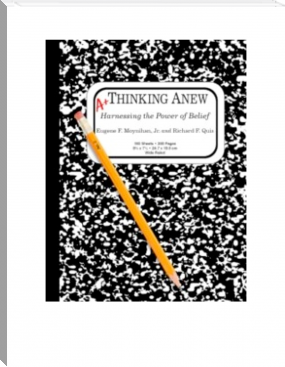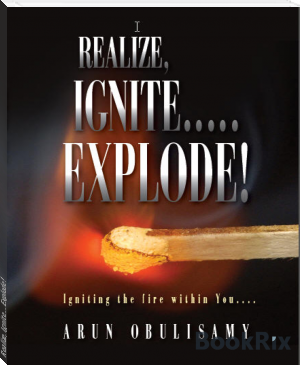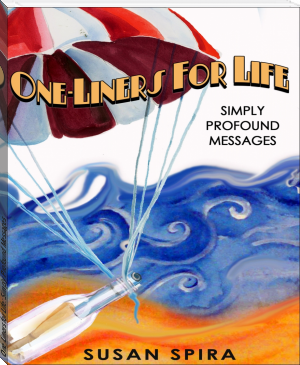mindset of a hero by Dr. Olusola Coker (best free ebook reader .txt) 📕

Read free book «mindset of a hero by Dr. Olusola Coker (best free ebook reader .txt) 📕» - read online or download for free at americanlibrarybooks.com
- Author: Dr. Olusola Coker
Read book online «mindset of a hero by Dr. Olusola Coker (best free ebook reader .txt) 📕». Author - Dr. Olusola Coker
To become a hero and be highly successful in life, requires three simple strategies.
The three strategies are- Prayers, fasting, and the right mindset. A copy of this book will teach you how to become a hero with the right mindset and be highly successful in life.
Prayers and fasting cannot work, you need to follow all the principles and strategies contained in this book to become a hero.
Don’t be deceived by anyone telling you when you pray and fast you will be highly successful in life.
Are you thinking of becoming a hero and being highly successful in life, then this book is for you.
Live the life of Hero
Live The Hero, like any other philosophy of life, necessitates some attentiveness. Change, like anything important in life, needs effort. Many of us don't take the time to assess if our present ideas, feelings, and beliefs are uplifting or depressing us on a regular basis.
Finally, it's about choosing to believe in yourself as a resilient and capable individual who has the power to mold your life as you see fit. The attributes listed below are essential to a heroic mindset.
The Golden Rule (Universal)
"Treat others as you want to be treated," you've probably heard before, regardless of your background. This is a crucial belief for heroes. The gratification of supporting the human desire for collaboration and maintaining the links that bind us together is the true goal of a hero, not glory or celebrity.
Take this basic hero quality to heart, and feel that all people are deserving of life, justice, and a sense of purpose (and therefore, happiness).
Keep the Biology of Negativity in Mind
The negative bias is a survival mechanism that we have. For millennia, it has served us well as a species by keeping us on the lookout for danger. However, it is now overstimulated by the fact that modern communication technology can deliver terrible news to us 24 hours a day, seven days a week! While we may admit that humans are capable of evil, we must also remember that we are also capable of immense good.
Human civilization and technology exist and have grown as proof that fairness and collaboration continuously triumph over the darker part of our nature. We would not have gone this far or survived this long if it hadn't been for that.
The hero mindset identifies negativity bias for what it is, then chooses to perceive the world as a place where both good and bad things occur. Life is neither fair nor unjust; it is simply what it is. This allows us to perceive the world as a place of possibilities rather than just sorrow.
Adapt to Uncertainty
There's nothing wrong with wanting to know what's going to happen next. It's human nature to desire predictability and comfort. But we all know that there is no such thing as complete assurance in life. In human society, attempting to evade or reject this fact generates issues.
Instead of futilely attempting to make the world certain, the heroic attitude teaches us that we may be confident in ourselves. We lay a firm foundation for our life if we create our own sense of purpose and meaning. We can get strength and confidence from relying on ourselves if we learn to develop self-worth and self-esteem.
Uncertainty is also seen as a source of possibility in the hero's attitude. It suggests your "destiny" hasn't been decided yet. As a result, you have complete control over your life. Even if others try to keep you down, they will never be able to overcome your tenacity and willpower.
Change your circle, and your life will change.
Writers make sure that their most successful protagonists have a particular perspective that affects how they approach and respond to events. As heroes and heroines grasp each day, these important attributes help them grow and win:
They have a soul. Even when they are afraid or facing difficulties, protagonists act in remarkable ways because they are enthusiastic and solution-oriented.
They see things from a different perspective. Victorious heroes and heroines keep an open mind (even about themselves), weigh all sides objectively, and keep the greater good in mind.
They are inquisitive, naturally curious, and eager to learn for the rest of their lives.
They are truthful, trustworthy, genuine, and committed.
They are empathic, aware of their surroundings, and accepting of their own and others' flaws.
They are forward-thinking doers who turn ideas into reality.
They achieve success by maintaining high standards and working more efficiently.
They "as if" they are the character they desire to be by dressing, behaving, and talking like the character they aspire to be.
They progress by constantly improving themselves and expanding relationships.
This last trait is crucial since every great protagonist – and every single individual in real life – evolves with time. We're all on a journey to become our best selves, and we're all on a character arc in our own story. We can get to where we want to be by developing these attributes through our professional and personal experiences.
You've certainly noticed as a reader or watcher that the protagonist often begins a novel uncertain or unsure of what he or she needs to do to develop and evolve. The characters do not have all of these hero or heroine characteristics at the start of the story (if they were, the story would have nowhere to go). Most people are unsure of their entire potential, talents, and power, which, to be honest, defines a lot of us. If you think like a writer, on the other hand, you'll learn to play the long game and become increasingly confident that your story will unfold and that you'll make progress.
Even if we adopt a protagonist's attitude, it's hard to think your character's path will be beneficial and transformative. Why? Because of our perceptions of ourselves and our apparent flaws. These truths, which all authors are aware of, will assist you:
Accept that each character is a product of their own blemished past, which simply implies that we're all imperfect in the same way.
Accept that we all have different levels of doubt, fear of failure, and feelings of inadequacy. Our paradoxes and perceived "weaknesses" are, in many ways, what makes us interesting and compelling.
Accept that people respond best to characters that are empathetic, vulnerable, and relatable - our flaws, which we strive so hard to hide, are often what makes us more compelling.
So embrace everything of who you are as you adopt a protagonist's perspective. The character journey lesson is that our flaws and wounds can eventually become our strengths and a significant part of what binds us to others.
Finally, remember that you are in the middle of a story as you progress through your career. That reality makes it harder for us to perceive our progress - in fact, we may feel as if we're going nowhere fast. If you find yourself in this situation, utilize it as a writing prompt. It's a good moment to reflect on your current progress and see if you can better align yourself with the important features of a protagonist attitude.
Today, do the following:
To assess your success, ask yourself the following three questions:
How have I progressed in my character arc thus far (maybe without even realizing it)?
What part of myself can I now let go of now that I'm finished with it?
What new feature of my career can I preserve and incorporate
around an hour ago
Why Did I Choose to Marry "Myself"?
I've cried a lot in my life, wishing that someone would love me as much as I love them.
They were correct; I did need to leave. How often do you have the opportunity to be in the same room as one of the persons you appreciate the most?
It wasn't like talking to my career advisor or running into my favorite basketball coach in a hotel lobby. This was an opportunity to meet the person who not only shows me how to do something, but also encourages me to do it better – an opportunity to meet my idol.
And we all need heroes in today's world.
A role model is not the same as a hero.
A hero is someone who inspires you to accomplish something. Role models may teach you how to do something, but a hero is someone who motivates you to do it. They shift your focus away from the "here and now" and toward something much larger than ourselves.
"To be a hero [is] to broaden people's notion of what was possible for a human being." "For us, our heroes are icons of all the characteristics we aspire to have and all the goals we aspire to achieve."
"He transcends what you think is possible," a buddy of mine put it when describing his hero.
Heroes' lives, despite their transcendence, are based in the human struggle.
Heroes are human beings who are inspired by human connection.
Every hero has encountered a significant struggle, whether internal, external, or a combination of the two. Some, like Nelson Mandela, have overcome a lifetime of obstacles.
"Nonetheless, they rose and did deeds of triumphant beauty," LaBarge said of heroes who overcame adversity. "Perhaps we should do the same."
"I was able to find strength in the examples set by people who were on the other side of the fight," one acquaintance recently told me about how he discovered the value of having a hero. It's not that his heroine (Kesha) was impervious to difficulties; it's how she overcame them. A hero might emerge from the "other side of the battle" and assist pave the path for those who want to follow in his or her footsteps.
What are heroes if not heroes? Celebrities.
The terms "celebrity" and "excellence" are not interchangeable.
It's not that well-known people can't be heroic; they can. Consider JJ Watt's outstanding Hurricane Harvey relief effort or Lin-Manuel Miranda's ability to inspire young, aspiring artists.
The point is that these people are heroes because of their actions or the way they live their lives, not because of their famous status.
It's easy to label those who have attained recognition as heroes in today's social media influencer-driven world. True heroism, on the other hand, is about character rather than fame or glory.
From brothers to saints, your heroes might be anyone.
A hero can be anyone. Not everyone can be a hero, but we all have the potential to be. While one might expect a soldier to have heroic inclinations, many of our greatest enduring heroes





Comments (0)